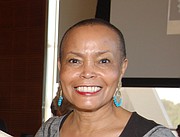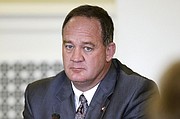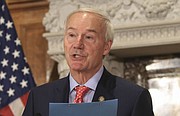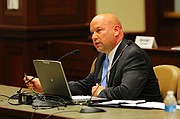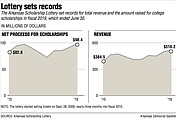The 10-year-old Arkansas Scholarship Lottery raised $98.4 million for college scholarships in the fiscal year that ended June 30, eclipsing the previous record set in its second full fiscal year of operations, the lottery reported Wednesday.
The record for net proceeds was $97.5 million in fiscal 2012.
Total revenue of $516.2 million in fiscal 2019 also set a record, outdistancing its previous record of $500.4 million last fiscal year, the lottery said in its monthly report to Gov. Asa Hutchinson and the Legislative Council's lottery oversight subcommittee.
"We really challenged the staff and they rose to the occasion and the results were fantastic," lottery Director Bishop Woosley said in a written statement.
"Obviously the Powerball and Mega Millions jackpots in October were a big part of our draw game success, but overall we set sales records for many of our draw and instant tickets games," he said. Instant tickets also are called scratch-off tickets.
The Arkansas Scholarship Lottery started selling scratch-off tickets on Sept. 28, 2009, and has helped finance Arkansas Academic Challenge Scholarships for more than 30,000 students during each of the past nine fiscal years.
The scholarships also are financed with $20 million a year of state general revenue and a $20 million reserve fund that covers temporary cash shortfalls regarding the payment of scholarships and the receipt of lottery proceeds.
Sen. Joyce Elliott, D-Little Rock, who is co-chairman of the lottery oversight subcommittee, said the record-breaking figures in fiscal 2019 are "very good news" that will help students who meet the current eligibility requirements for the challenge scholarships.
But Act 1005 of 2015 severely curtailed the number of students eligible for the scholarship, she said in an interview.
SCHOLARSHIP CRITERIA
Elliott said the Legislature should consider changing the eligibility requirements so that a high school graduate has either at least a 2.5 grade-point average, or a minimum score of 19 on the ACT or its equivalent on other exams.
The current law requires a 19 or better on the ACT or equivalent on other exams.
Elliott said the change would allow more students to be eligible for the scholarship.
"I think it is something that we ought to bring up in the fiscal session" that starts in April 2020, she said. "The sooner, the better."
But the sponsor of Act 1005, Sen. Jimmy Hickey, R-Texarkana, said in an interview, "I will not be for that in any way, shape or fashion.
"I wouldn't see any reason to break something we have fixed," he said.
"You start going that other way and we wouldn't have money to fund that new stuff we put in" that is also financed by the lottery.
Act 1005 also reduced the scholarship size from $2,000 to $1,000 for freshmen at two- and four-year colleges; increased the scholarship from $3,000 to $4,000 in the sophomore year at four-year colleges; and increased the scholarship from $2,000 to $3,000 for the sophomore year at two-year colleges. Supporters of the law said it would shift money to students who completed their studies and help guard against the program running short of funds, while its critics said they worried the law would hurt poor and minority students.
Also in 2015, during his first year in office, Hutchinson signed into law another measure that put his administration in control of the lottery by placing it in the state Department of Finance and Administration. That law also abolished the independent nine-member Lottery Commission that controlled the agency.
Hutchinson said on Wednesday in a written statement that "the reform measures we put in place beginning in 2015 have made a difference both in terms of controlling expenses and in revenue.
"In terms of a change in the distribution criteria, I would agree it is time to evaluate the impact of the changes on students and determine whether any adjustments are necessary," he said.
The lottery has been on the rebound since fiscal 2015, when its revenue slipped to $409.2 million and its net proceeds for college scholarships dropped to $72.6 million in what was the third successive fiscal year of declines of both.
The Legislature reduced the size of the future scholarships three times before the lottery bounced back.
Since then, the Legislature created three more lottery-financed scholarship programs: the Arkansas Workforce Challenge Scholarship program in 2017, and the Arkansas Concurrent Challenge Scholarship program and Arkansas Academic Support Scholarship program earlier this year.
In fiscal 2019, the state awarded Arkansas Academic Challenge Scholarships totaling $91.2 million to 32,514 students, said Alisha Lewis, a spokesman for the state Department of Education, which now includes the Higher Education Division under a state government reorganization. That's slightly less than the $91.9 million in scholarships distributed to 33,022 students in fiscal 2018.
The total value of Arkansas Academic Challenge Scholarships peaked in fiscal 2012 at $132.9 million, according to the Higher Education Division.
"The reason we have not been able to give a projection for the 2019-2020 academic year is because of legislation changes," Lewis explained in a written statement. "There was a change that allows students to receive the lottery scholarship if they have a superscore of 19 on the ACT instead of a composite score of 19. The difference between the two could be a vast number of students who are now eligible for the scholarship.
"We have had two conferences with ACT who are telling us when we can expect to begin receiving the new calculated scores (as early as November hopefully). The lottery ... and their marketing counterparts would love for us to give projections and honestly we can give them flat based on this year, but they, rightfully so, should be more. How much more is impossible to determine," she said.
Under Act 549 , sponsored by Rep. Fred Allen, D-Little Rock, superscore "means the final composite score that is calculated according to a combination of the highest individual section scores across all of the ACT tests taken by an individual."
In fiscal 2019, the state also handed out 243 Arkansas Workforce Challenge Scholarships totaling $191,093, Lewis said.
PROJECTIONS
In 2008, voters approved the constitutional amendment authorizing the Legislature to create the scholarship lottery. The lottery's leading proponent, then-Lt. Gov. Bill Halter, a Democrat, had projected it would raise about $100 million a year for college scholarships. Others suggested lower figures.
The Department of Finance and Administration estimated about $55 million for scholarships. Arkansas Advocates for Children and Families, a lottery foe, forecast about $61.5 million.
Fiscal 2019 was the fifth fiscal year in which net proceeds exceeded $90 million.
Beyond fiscal 2012's $97.5 million, the lottery also raised $94.2 million in fiscal 2011; $90.2 million in fiscal 2013; and $91.9 million in fiscal 2018.
The lowest total of net proceeds was $72.6 million in fiscal 2015.
In fiscal 2019, draw-game revenue increased by $15.5 million over fiscal 2018 to $107.6 million, while scratch-off revenue rose by about $200,000 over the previous year to $407.8 million, according to the agency's reports for these fiscal years. The revenue includes fees paid by 1,900-plus retailers.
Draw games include Powerball, Mega Millions, Natural State Jackpot, Cash 3, Cash 4, FastPlay and Lucky for Life.
Woosley said that "the two huge jackpots in the fall accounted for a good bit of the draw sales increase [and] we had our best Natural State Jackpot year ever, which was buoyed by a record Natural State Jackpot in the spring.
"In the fall, we noticed a trend of instant tickets sales declining a bit. I believe the huge jackpots in October likely negatively impacted instant ticket sales for a week or two," he said. "In addition, we noticed negative trends in some price points and areas for instant tickets. After some analysis, we refined our approach in all divisions and saw sales improve in the spring. Unfortunately, that momentum was impacted, understandably, by the floods in late May and early June. Had it not been for that issue, I think we would have finished about $2-3 million up in instant tickets for the year, versus the $200,000 up."
For fiscal 2020, which started July 1, Woosley has projected total revenue of $497 million and net proceeds for scholarships of $89.3 million.
Woosley said the Arkansas lottery will be affected by expanded casino gambling in the state and by Mississippi's lottery starting up in December.
"That said, our projections were conservative anticipating some impact from some or all of the new gaming that will take place in the state or on our border," he said.
A Section on 07/11/2019

